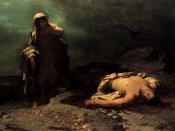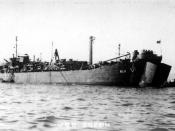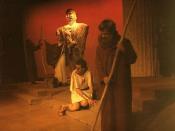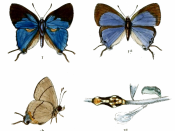Creon The question of who the hero or heroine of Sophocles' Antigone has perplexed scholars for years. In Greek Mythology, Aristotle has told us that a tragic hero or heroine is a character, usually of high birth, who is neither totally good nor totally evil. Also some type of weakness or error in judgment brings about their downfall. The most crucial part of a tragic hero or heroine is that the person accepts full responsibility of his or her actions and becomes a better person because of his or her downfall. The true tragic hero or heroine in Antigone is the character, which evolves the most, which is proves to be Creon.
The first and most apparent characteristic of a tragic hero or heroine is that both Creon and Antigone are born into royalty and have a high position or standing in society. Antigone is daughter to King Oedipus, which at birth establishes her royal status and high standing in her country, Thebes.
Creon is brother to Antigone's mother, Queen Jocaste, who is blood queen to Thebes. Creon proves he is King of Thebes, when he makes the statement to the chorus and says, ""æyour devotion to King Laios was absolute; you never hesitated in your duty to our late ruler Oedipus' and, when Oedipus died, your loyalty was transferred to his children. Unfortunately, as you know, his two sons, the princes Eteocles and Polyneices, have killed each other in battle; and, I as the next blood, have succeed to the full power of the throne"à(Pages 1014 "à1015, lines 12-16). This clearly establishes Creon's royalty and high standing Both Antigone and Creon meet the first criteria for a tragic hero or heroine.
The second characteristic of a tragic hero or heroine is that the character must be essentially good and not totally evil; someone that is admired for his or her actions. Antigone believes that both her brothers should receive a proper burial. She goes to her only remaining sibling Ismene and says, "Listen, Ismene: Creon buried our brother Eteocles With military honors, gave him a solder's funeral, And it was right that he should; but Polyneices, Who fought as bravely and died as miserably- They say that Creon has sworn No one shall bury him, no one mourn for him, But his body must lie in the fields, a sweet treasure For carrion birds to find as they search for food.
That is what they say, and our good Creon is coming here To announce it publicly; and the penalty "ÃÂ Stoning to death in the public square!"ÃÂ (1013 "ÃÂ1014, 14 "ÃÂ20).
Antigone appears to be a loving sister who only wants what is right for her brother and give him a proper burial, even if that means defying the king and being stoned to death. Antigone is basing her believe on the law of the gods and using that to defend her actions.
Creon also is essentially good because he puts his country first in the statement ""æI say to you at the very outset that I have nothing but contempt for the kind of Governor who is afraid, for whatever reason, to follow the course that he knows is best for the State; and as for the man who sets private friendship above the public welfare, "àI have no use for him either"à(1015, 19 "à22). Creon has tried to live a truth full by doing what he feels is right for his country. Antigone and Creon are both looked up to by the people because of what they stand for.
The third most important characteristic of a hero or heroine is the one in which the fallen individual not only realizes his/her mistake or flawed personality, but also becomes a better character because of it. Antigone has the support of the people because she appears to be pure and venerable. The point in which Antigone falls is when she says ""æbut Creon deemed me guilty of error therein, and of outrage, ah brother mine! And now he leads me thus, a captive in his hands; no bridal bed; no bridal song hath been mine, no joy of marriage, no portion in the nurture of children; but thus, forlorn of friends, unhappy one, I go living to the vaults of death"à(handout). Antigone attempts to draw pity from the people and fails because it comes off as a selfish gesture. The people begin to question her motives for her actions. Once Antigone realizes Creon will not spare her, she goes to her grave saying, "What things I suffer, and at what men's hands, Because I would not transgress the laws of heaven"à(1029, 79-80) Antigone has not truly accepted responsibility for her actions. She has proved this by being stubborn and not accepting Creon's dismissal of her actions when he questions her about her disobedient behavior in burying her brother.
Similarly, Creon is stubborn because he stands his ground with Antigone, even though his son Haimon pleads with him to spare his fiancÃÂé, Antigone. Creon proves to be even more stubborn to his own his own son, his own blood, Haimon. Creon denies his son's pleas and continues to uphold Antiogone's punishment. After entombing Antigone, Creon is told by Teiresias that he has made a grave mistake and to "Give in to the dead man, then: do not fight with a corpse- What glory is to kill a man who is dead"à(1030 "à1031, 36-37).
This is where Creon begins to see his downfall as he listens more to Teiresias and is uncertain about how to stop what he had begun. It is only when Choragus reinforces Teiresias's statements that Creon knows he must cleanse himself of his wrong doing by burying Polyneices and freeing Antigone from her grave. Choragus tells Creon to "Go quickly: free Antigone from her vault And build a tomb for the body of Polyneices"ÃÂ (1302, 96 "ÃÂ 97).
Creon goes to do the task asked of him, but does not do them in the order given. The moment of perpeteia is when Creon arrives at Antigone's grave and finds not only Antiogone, but also his son Haimon, who has already opened the tomb and has found his fiancÃÂé dead by her own hands. Haimon disgusted with his father and blaming him for her death, takes his own life, thus leading to Eurydice, Creon's wife, killing herself. Creon brings home is dead son, only to find his dead wife.
The previous discussions about and excerpts from Antigone clearly illustrate that Creon is the true tragic hero. It is apparent that stubbornness and steadfastness is not always a positive attribute. These character flaws are responsible for the downfall of Creon.





